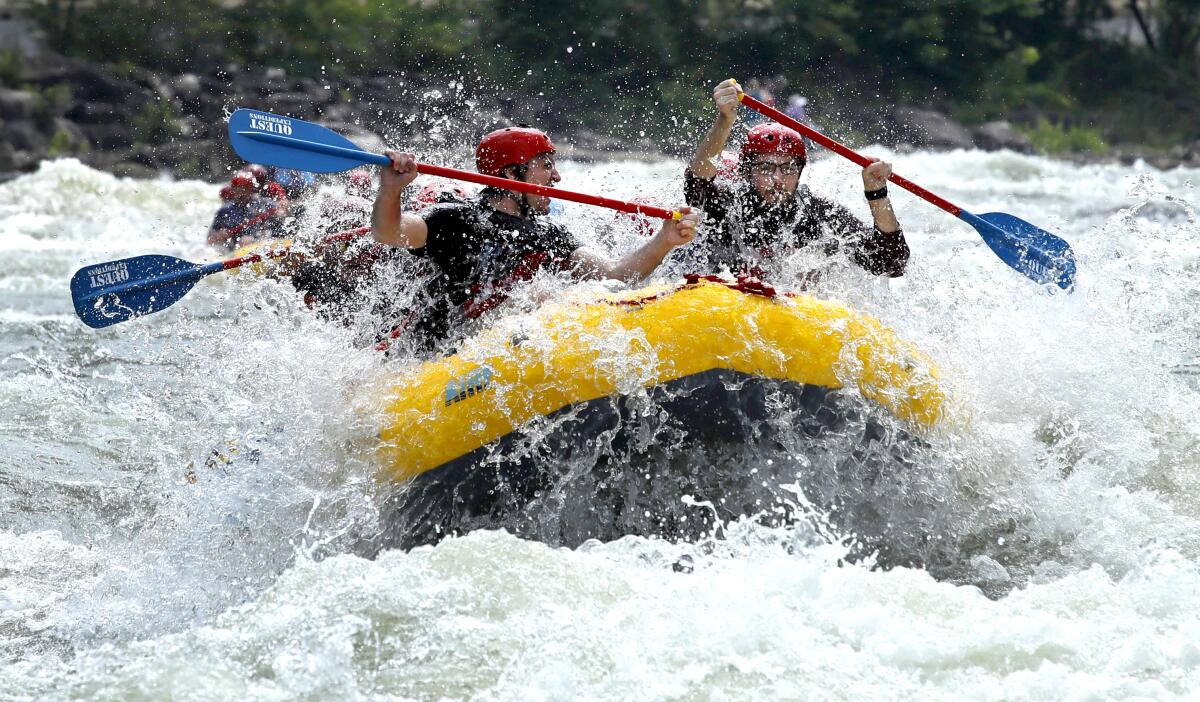From glamp counselor to ski resort waiter, how to find the best seasonal jobs

- Share via
It may still feel like winter in many parts of the country, but now is the time to start looking for summer jobs. Summer jobs are perfect for the demographic bookends of the temporary and part-time workforce — students and seniors. They can also be an attractive option for teachers, if they don’t mind working during school breaks.
While there are many types of summer jobs, arguably the most attractive are in camps, resorts and hotels. These jobs are likely to be plentiful after two years of dismal hiring due to travel and leisure restrictions related to COVID.
Summer jobs
Indeed, many seasonal job platforms are seeking workers for jobs that start as soon as March. Among the top 10 jobs highlighted by CoolWorks, for example, are several openings at a “glamping” destination on a scenic stretch of the Northern California coast. In addition to earning $17 an hour, the job offers free housing in a renovated farmhouse that’s walking distance to the beach. The one catch: If you take the job, the employer wants a commitment that you’ll stay for at least four months.
Meanwhile, VagaJobs is highlighting a variety of positions at the El Capitan Lodge in Southern Alaska. Pay varies by position. But private housing and meals are provided at no cost to the employee. In addition, the site will reimburse employees for travel from Juneau to the resort.
Ideal candidates
Only a handful of these summer jobs require experience or training. Most ask only that workers be over the age of 18 — or 21 for positions where you’ll be selling or serving alcohol. Otherwise, the biggest question that most seasonal employers have is how many months you can work. By and large, resorts favor candidates who have the ability to stay for a “season.”
The length of the season will vary by the individual resort. Some are truly summer camps — opening in June and closing in September. These jobs can be ideal for college students and schoolteachers.
If you have a sharp eye for written language, earning an income stream from proofreading presentations or reviewing books isn’t as hard as you may think.
However, other resorts operate year-round, but hire for peak seasons that can span from late March to early November. The resorts that have longer seasons often prefer to hire young retirees, who have more flexibility to stay until their season ends.
Seasonal nomads
Notably, although now is when resorts are looking to fill summer jobs, people who enjoy this type of work can easily find winter jobs too. Indeed, Dylan Morra, founder of VagaJobs, says he founded his site to make it easier for seasonal nomads like him to find back-to-back seasonal work. He says he’s been everything from a whitewater rafting guide to a waiter at a ski resort.
The perks are amazing, he adds. “While other people are spending thousands of dollars, you can be working at a ski resort in Aspen and skiing for free.”
Most resorts allow workers to partake in activities for free, such as horseback riding, skiing, fishing or rafting. Housing and meals are also generally provided either for free or for a highly discounted rate. Consequently, workers often find they can save substantial sums during a season, even though the hourly pay often isn’t anything to brag about.
However, potential employees should realize that most of the housing is shared. This can be fun for anyone who is happy to live in a dorm-like setting. But couples and those who simply don’t like sharing a living space should be sure to check the housing options before applying. Housing is often provided because these resorts can be so remote that there are few other housing options. And if you hate the housing, you’re likely to hate the job.
The jobs
What type of work might you be doing? Available positions range from front desk operations to housekeeping and cooking. Some jobs involve planning or leading activities — fishing, hiking, rafting, riding, games and other guest entertainment.
Most of these positions are paid hourly at rates ranging from minimum wage to about $20 an hour. But overtime is often available..
There are also a number of managerial and technology positions that pay more but require previous experience or credentials.
Where to find work
You have two basic options for finding seasonal jobs: You can apply directly to a resort, or you can go to one of several sites that seek staff for an array of resorts.
The top seasonal job sites include CoolWorks and VagaJobs, as well as XanterraJobs, which provides staff for many U.S. national parks. Another site called SeasonWorkers recruits for international summer jobs.
Broad-based job boards, such as Indeed and Glassdoor, can also connect you with summer jobs.
Kristof is the editor of SideHusl.com, an independent website that reviews moneymaking opportunities in the gig economy.
More to Read
Inside the business of entertainment
The Wide Shot brings you news, analysis and insights on everything from streaming wars to production — and what it all means for the future.
You may occasionally receive promotional content from the Los Angeles Times.











